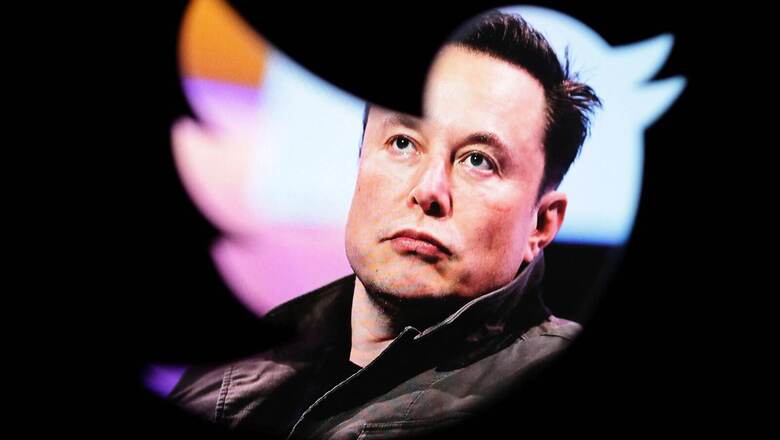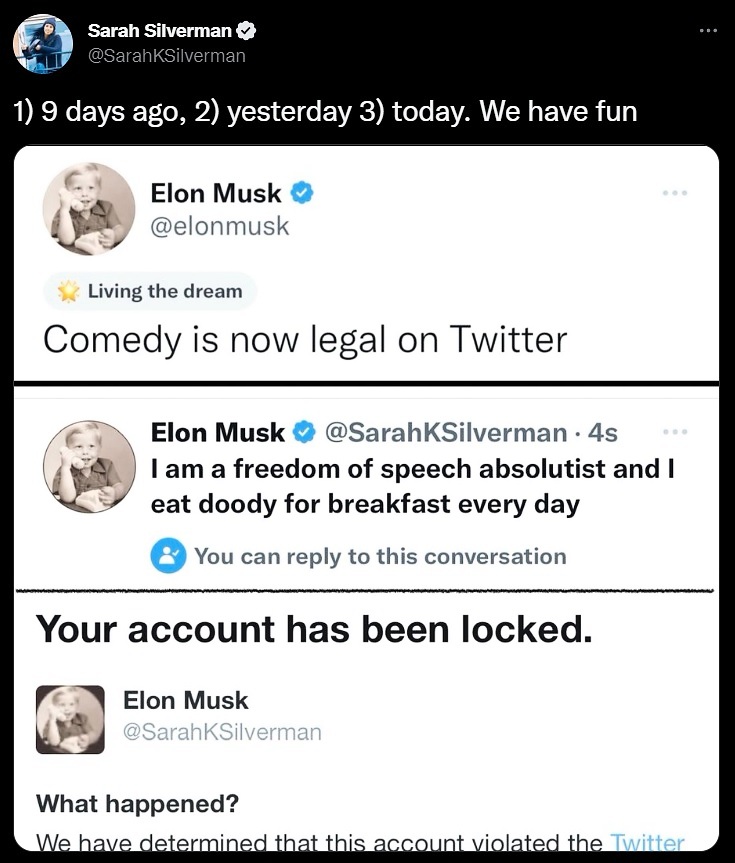
views
Right from the day billionaire Elon Musk carried a sink into Twitter’s headquarters in San Francisco after acquiring the microblogging giant, his moves and those by the company continue to be in the spotlight.
Musk has turned his Twitter handle into a sort of bulletin board, from where statements are being made in tweets. From “the bird is freed” to “$8 for all”, Musk is making some big announcements after his takeover.
But Twitter’s new owner, who calls himself a “free speech absolutist”, has many users confused with his contradictory and headline-grabbing antics.
Not Funny
The suspension of American comedian Kathy Griffin’s Twitter account gained massive traction on the platform. It is believed that her account was suspended for her impersonation of Musk.
She tweeted about the US midterm elections under Musk’s name. While responding to the screenshot of Griffin’s suspended account, Musk wrote on the platform that she was removed for “impersonating a comedian”.
After he took over the company’s reins, the same Musk had tweeted: “Comedy is now legal on Twitter.” Popular Twitter accounts joking about or impersonating Musk have cropped up across the platform since.
In a Twitter thread, he stated: “Previously, we issued a warning before suspension, but now that we are rolling out widespread verification, there will be no warning. This will be clearly identified as a condition for signing up to Twitter Blue.”
“Any name change at all will cause temporary loss of verified checkmark,” he added.
This seems to be a contradictory update from a man, who tweeted about “comedy” just a few days ago. It may indicate that comedy is acceptable on the platform, as long as it does not break any “rules” that can probably be changed at the drop of a hat and be subject to Musk’s whims.
Similar to Griffin, another American comedian Sarah Silverman changed her Twitter name and profile picture to match Musk’s, bringing attention to the problem with a verification system that does not actually verify account ownership.
Silverman tweeted: “I am a freedom of speech absolutist and I eat doody for breakfast every day.” However, after changing her account back to her own name and photo, she tweeted a screenshot indicating that it had been locked.

Musk has stated that his goal for Twitter is for it to become “by far the most accurate source of information about the world”, so the crackdown on impersonator accounts is all a part of that mission. Additionally, the new owner has also strengthened his commitment to “free speech” stating, “My commitment to free speech extends even to not banning the account following my plane, even though that is a direct personal safety risk.”
No pardon for parody
Here, it needs to be highlighted what Musk stated on the platform regarding parody. He wrote: “Going forward, any Twitter handles engaging in impersonation without clearly specifying ‘parody’ will be permanently suspended.”
A YouTube channel and podcast with 2.3 million Twitter followers, h3h3Productions, had its account suspended this week after changing its display name to “Elon Musk” and using an out-of-date Musk avatar. Parodying Musk, the account tweeted: “Even though Jeffery Epstein committed horrible crimes, I do still miss him on nights like this for his warmth and comradery. Rest In Peace old friend.”
The tweet gained over 12,000 likes and had about 2,000 retweets. But later the account was banned. According to reports, the suspension took place even after the account changed its bio to clearly state that it was a parody account and its banner to an image that says “parody account”.
This incident also looks like a contradiction to what Musk stated regarding parody accounts.
Twitter’s policy or Musk’s?
It should, however, be noted that Twitter’s current policies already include a section devoted to “parody, commentary, and fan accounts”. It states: “Under this policy, a parody, commentary, or fan account is an account that depicts another person, group, or organization in their profile to discuss, satirize, or share information about that entity.”
The policy also states that while these accounts may use elements of another’s identity, they also include profile language indicating that the account is not associated with the profile’s subject. “Accounts that post news updates about a specific entity, commonly known as newsfeed accounts, and role playing accounts may also fall under this designation,” it added.
Additionally, it states that accounts can indicate that it is not affiliated with the subject portrayed in the profile “by incorporating words such as, but not limited to, ‘parody’, ‘fake’, ‘fan’, or ‘commentary’. This language should be stated in a way that can be understood by the intended audience.”
In the case of suspension, Twitter’s own policy highlights three levels and the company suspends accounts after following the first two levels.
First is Profile Modification, which states: “When we receive a valid report, we may provide an opportunity to bring your account into compliance. If we determine you did not sufficiently distinguish your account name and bio, we may require you to edit the content on your profile.”
The second level is Temporary Suspension. In this case, the policy states: “If you fail to make profile edits in the time frame designated within our request, we may temporarily suspend your account. In some instances, we may temporarily suspend your account before requesting edits.”
Then comes the last one, Permanent Suspension, which clearly states that if a Twitter user makes “insufficient edits” to the profile “after your first warning, we may permanently suspend your account”.
So, as it appears now, the recent suspension of accounts took place skipping the first two levels. This has triggered widespread debate on content management decisions, as well as if there is a policy change about which people are not aware or if this is all about the new boss taking the final call.
Read all the Latest Tech News here




















Comments
0 comment